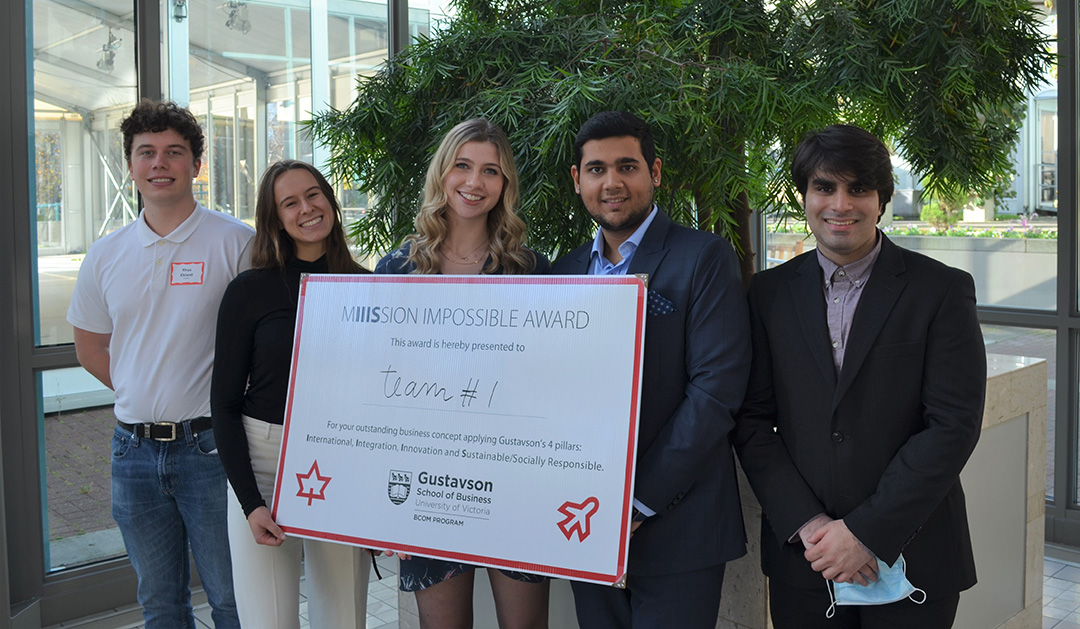by Alex Berthin, Coordinator, Centre for Social and Sustainable Innovation. Photo: submitted.
On Friday, November 8th, students from the Gustavson’s BCom program descended on the Victoria Conference Centre for the annual MIIISsion Impossible competition. MIIISsion Impossible has an unusual spelling, but that spelling has a significant meaning. The event reflects Gustavson’s four pillars: Integrative, Innovative, International and Sustainable/Socially Responsible.
The evening before, student groups were tasked with teaming up with an exchange partner to create a business pitch that addresses a social or sustainable concern in their exchange partner’s home country. After spending an evening identifying an issue and coming up with a business solution, the teams convened at the conference centre. The conference hall had four judging rooms, where 55 teams alternated pitching their sustainable or social business ideas to industry professionals and faculty judges. Each group had four minutes to present their pitch and a few more minutes to answer the judges’ questions afterward.
Throughout the day, there were a total of five winning teams: one team for each of Gustavson’s five BCom cohorts. From the first cohort, team one had the winning idea with their pitch for a business that set up algae farms in India; their objective was to pitch a product that addresses India’s air pollution and provides sustainably sourced food. Team 13 won from the second cohort with their pitch to establish a fully electric fleet of mopeds in Vietnam as a low-cost and low-emission transportation alternative. Next, team 30 from cohort three won the judges’ favour with their pitch to produce sustainable hemp clothing in Mexico. Then, from cohort four, team 40 won with their idea to provide fully biodegradable cups at soccer stadiums in Brazil. Finally, team 54 from cohort 5 took the final win of the day with their pitch to create a non-profit organization that encourages women to enter the workforce by selling affordable second-hand professional wear. All five teams took home a cash prize.
Gustavson’s diversity was put on display, as every team tackled issues from countries throughout the globe. Student Roddie Giroux noted the international element of the pitch competition: “There were a lot of diverse pitches from all teams as we’re not focusing on the same countries or the same issues.” Many international students commented how it was a great way to share their culture with their Canadian peers. Not only did international students share their culture, but many also expressed that they learned new things about their home country. Canadian students noted that forcing the problem in another country added unique challenges that made the competition more engaging.
Yet, as in any business pitch, things don’t always go as planned. Team 12 had an interesting roadblock when they had to get started without the advantage of their international representative. The team began work by searching online for issues that their exchange partner’s country, Chile, faces. The team came up with a plan to address air particulates, but when their exchange student joined them, it became clear that their entire pitch was not possible. Local bylaws banned the very process the team was relying on. The team remarked how this highlighted the importance of local knowledge beyond the internet. With the exchange student’s help, the team recreated their pitch to address carbon capture and storage in the Chilean mining industry.
The event proved to be a positive experience for students, forcing them to think holistically about everything they have learned in their classes up to this point. Students were able to practice public speaking in a professional environment, yet MIIISsion Impossible also forced students to think outside the box in order to address urgent social responsibility and sustainability issues. “It was valuable to focus on sustainability and also to look at it from a profit perspective because often sustainability instruction is not focused on creating sustainable profits,” says third-year BCom student Wyndm Robinson. The integration of international sustainable and social planning with real-life experiences made Mission Impossible a unique learning experience, and ultimately set these students up for future success.


